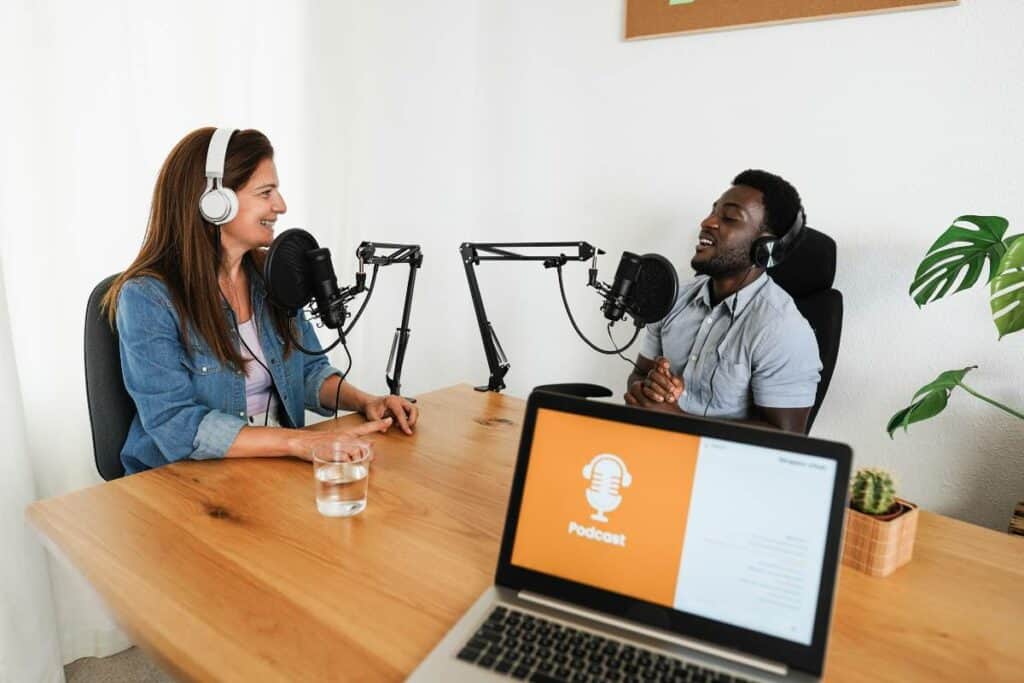In today’s ever-growing podcast landscape, monetization has become a crucial aspect for creators looking to turn their passion into a sustainable income stream. As a seasoned podcaster, I’ve witnessed firsthand the importance of implementing effective monetization strategies to ensure the longevity and success of your show. In this comprehensive guide, we’ll dive deep into the world of podcast monetization, exploring proven tactics and innovative approaches that will help you thrive in 2024 and beyond. Whether you’re a beginner or a veteran podcaster, this article will provide you with the tools and knowledge necessary to take your podcast to the next level and generate revenue from your hard work.
Key Takeaways
- Understand your audience and niche to create valuable content and attract sponsors
- Utilize a mix of direct and indirect monetization strategies to maximize revenue
- Continuously refine your strategies and adapt to industry changes for long-term success
Understanding Your Audience and Niche
Before we delve into the various monetization strategies, it’s essential to lay a solid foundation by understanding your audience and niche. This knowledge will guide your content creation and help you attract the right sponsors and partners.
Identifying your target audience is the first step in this process. Ask yourself questions like:
- Who is my podcast aimed at?
- What are their interests, demographics, and pain points?
- How can my content provide value to them?
Once you have a clear picture of your target audience, it’s time to research your niche and competitors. Analyze successful podcasts in your niche and identify what sets them apart. Look for gaps in the market that your podcast can fill and unique angles you can explore to differentiate yourself.
Armed with this knowledge, focus on creating valuable and engaging content that resonates with your audience. Consistently deliver high-quality episodes that address their needs and interests, and don’t be afraid to experiment with different formats and topics to keep things fresh.
As you consistently provide value, you’ll naturally start building a loyal listener base. Engage with your audience through social media, email newsletters, and even live events. Foster a sense of community around your podcast, and encourage listeners to share their feedback and suggestions. This loyal audience will be the foundation upon which your monetization efforts will thrive.
Developing a Strong Brand Identity
In the competitive world of podcasting, having a strong brand identity is crucial for attracting sponsors and partners. Your podcast’s brand should be unique, recognizable, and consistent across all platforms.
The importance of branding in podcast monetization cannot be overstated. A well-defined brand helps you stand out from the crowd, builds trust with your audience, and makes your podcast more attractive to potential sponsors. Invest time in creating a unique and recognizable podcast brand that aligns with your niche and target audience.
When developing your brand, consider elements such as:
- Your podcast’s name and logo
- The color scheme and visual aesthetics
- Your show’s tone and personality
- The type of content you produce
Consistency in branding across all platforms is key. Ensure that your podcast’s branding is uniform across your website, social media profiles, merchandise, and any other touchpoints. This consistency helps create a cohesive and professional image, making it easier for listeners and sponsors to recognize and connect with your brand.
As you grow your podcast, leverage your brand to attract sponsors and partners. A strong brand identity makes your podcast more attractive to companies looking to advertise to your target audience. It also opens up opportunities for collaborations with other podcasters and businesses in your niche, helping you expand your reach and grow your monetization potential.

Direct Podcast Monetization Strategies
Now that we’ve covered the foundations of understanding your audience and developing a strong brand, let’s dive into the various direct podcast monetization strategies you can employ.
Sponsorships and affiliate marketing
Sponsorships are one of the most common and lucrative ways to monetize your podcast. To find the right sponsors, start by identifying companies that align with your niche and target audience. Research their products, services, and values to ensure a good fit.
When negotiating sponsorship deals, be prepared to present your podcast’s unique value proposition and audience demographics. Determine the type of sponsorship you’re offering (e.g., pre-roll, mid-roll, or post-roll ads) and the pricing structure (e.g., cost per mile or CPM, cost per acquisition, or CPA).
Affiliate marketing is another effective monetization strategy. By partnering with companies and promoting their products or services, you can earn a commission for each sale or lead generated through your unique affiliate link. Choose products that align with your niche and provide value to your listeners.
Subscriptions and exclusive content
Offering subscriptions and exclusive content is a great way to generate recurring revenue from your most dedicated listeners. Create premium content, such as ad-free episodes, bonus interviews, or behind-the-scenes footage, that is only accessible to subscribers.
When setting up a subscription model, choose a platform that aligns with your needs and audience preferences. Popular options include Patreon, Substack, and Apple Podcasts Subscriptions. Determine the pricing tiers and rewards for each level of subscription.
Promoting your exclusive content is key to attracting subscribers. Regularly mention the benefits of subscribing in your episodes, and create enticing previews or teasers of your premium content on social media and your website.
Selling branded merchandise
Selling branded merchandise is another way to monetize your podcast and strengthen your brand identity. Design appealing t-shirts, hats, mugs, or other items that feature your podcast’s logo or catchphrases.
To set up an online store, choose a platform that integrates seamlessly with your website and offers easy order fulfillment. Popular options include Shopify, WooCommerce, and Printful.
Promote your merchandise to your listeners by mentioning it in your episodes, showcasing it on your website and social media, and offering exclusive discounts or bundles to your subscribers.
Crowdfunding and donations
Crowdfunding and donations can be effective ways to monetize your podcast, especially if you have a highly engaged and supportive audience. Choose a crowdfunding platform that aligns with your goals and audience, such as Kickstarter, Indiegogo, or GoFundMe.
When creating a compelling campaign, clearly communicate your podcast’s mission, goals, and how the funds will be used. Offer enticing rewards and incentives for donors, such as exclusive content, merchandise, or even the opportunity to be a guest on your show.
Promote your crowdfunding campaign through your podcast episodes, social media, email newsletters, and any other channels where your audience is active.
Indirect Podcast Monetization Strategies
In addition to direct monetization strategies, there are several indirect ways to generate revenue from your podcast. These strategies involve leveraging your podcast to promote other products, services, or opportunities.
Selling your products or services
If you have your own products or services that align with your podcast’s niche, promoting them to your listeners can be a highly effective monetization strategy.
Start by identifying products or services that align with your podcast and provide value to your audience. These could be digital products like e-books, courses, or templates, or physical products related to your niche.
Next, create a sales funnel that guides your listeners from your podcast to your product or service. This could involve mentioning your offerings in your episodes, creating dedicated landing pages, and offering exclusive discounts or bonuses to your listeners.
Promote your products or services through your podcast by naturally integrating them into your content. Share case studies, success stories, or testimonials from satisfied customers to build trust and credibility.
Public speaking and workshops
As a podcaster, you have the opportunity to establish yourself as an expert in your niche. This expertise can open up doors for public speaking and workshop opportunities.
Start by developing a compelling speaking topic that aligns with your podcast’s theme and provides value to your target audience. Create an engaging presentation that showcases your knowledge and personality.
To find speaking opportunities, research conferences, events, and webinars in your niche. Reach out to organizers with a compelling pitch that highlights your expertise and the value you can bring to their audience.
Promote your speaking engagements through your podcast, social media, and email newsletters. Encourage your listeners to attend and share their experiences, which can help attract new speaking opportunities in the future.
Coaching and consulting services
If your podcast focuses on a specific skill or industry, offering coaching and consulting services can be a lucrative monetization strategy.
Start by identifying your area of expertise and the specific problems you can help your clients solve. Develop a structured coaching or consulting program that delivers tangible results.
Create a coaching or consulting package that outlines your services, pricing, and the benefits clients can expect. Consider offering different tiers or customizable options to cater to a range of budgets and needs.
Promote your services through your podcast by sharing success stories, offering free consultations, or providing valuable tips and insights related to your area of expertise.
Repurposing content for other platforms
Repurposing your podcast content for other platforms can help you reach new audiences and generate additional revenue streams.
One popular option is repurposing your podcast for YouTube. Create video versions of your episodes by recording yourself or using visual aids like slides or animations. Optimize your videos for search and engage with your audience in the comments section.
Another option is creating blog posts and articles based on your podcast episodes. Transcribe your episodes and edit them into written content that can be published on your website or other platforms like Medium or LinkedIn.
Finally, leverage social media to promote your repurposed content. Create engaging posts, quotes, and graphics that showcase the key insights from your episodes and encourage your followers to engage with your content across different platforms.
Building Strategic Partnerships
Building strategic partnerships can be a powerful way to amplify your podcast’s reach and monetization potential. By collaborating with other podcasters, brands, and businesses, you can tap into new audiences and create mutually beneficial opportunities.
Start by identifying potential partners in your niche. Look for podcasters with complementary topics or audiences, as well as brands and businesses that align with your values and target market.
Cross-promotion and collaboration with other podcasters can help you reach new listeners and grow your audience. Consider guest starring on each other’s shows, creating joint episodes or series, or promoting each other’s content on social media.
Partnering with brands and businesses can lead to sponsored content opportunities, affiliate partnerships, or even co-branded products or services. Approach potential partners with a clear value proposition that outlines how your podcast can help them reach their goals.
When building partnerships, focus on creating mutually beneficial relationships that provide value to all parties involved. Be transparent about your expectations and deliverables, and continuously communicate with your partners to ensure a smooth and successful collaboration.

Optimizing Your Podcast for Monetization
To maximize your podcast’s monetization potential, it’s essential to optimize your show for discoverability and track your performance using key metrics.
Improving your podcast’s discoverability
Implementing podcast SEO strategies can help your show rank higher in search results and attract new listeners. Research relevant keywords and include them naturally in your episode titles, descriptions, and show notes.
Optimizing your podcast description and tags is another crucial aspect of discoverability. Write compelling descriptions that accurately reflect your episode’s content and include relevant tags to help listeners find your show.
Leveraging social media and other platforms can also help boost your podcast’s visibility. Share engaging posts and clips from your episodes, participate in relevant online communities, and collaborate with other creators to expand your reach.
Analyzing and tracking your podcast metrics
Understanding key podcast metrics is essential for making data-driven decisions about your monetization strategies. Important metrics to track include:
- Downloads and listens per episode
- Audience demographics and geographical data
- Engagement metrics like reviews, ratings, and social media shares
- Revenue generated from various monetization channels
Using analytics tools like Apple Podcasts Connect, Spotify for Podcasters, and your hosting platform’s built-in analytics can help you track your performance and identify areas for improvement.
Regularly review your metrics and use these data-driven insights to refine your monetization strategies. Identify which strategies are generating the most revenue and double down on those efforts, while also experimenting with new approaches to diversify your income streams.
Continuously refining your monetization strategies
The podcasting landscape is constantly evolving, so it’s crucial to stay adaptable and continuously refine your monetization strategies.
Experiment with different monetization methods and track their performance to identify what works best for your podcast and audience. Don’t be afraid to try new approaches or pivot your strategies based on your data and feedback.
Stay informed about changes and trends in the podcasting industry by attending conferences, joining online communities, and following thought leaders in the space. This will help you stay ahead of the curve and identify new opportunities for growth and monetization.
Finally, stay committed to creating high-quality content that resonates with your audience. While monetization is important, your listeners should always remain your top priority. By consistently delivering value and building strong relationships with your audience, you’ll create a solid foundation for long-term success and profitability.
What Are the Key Podcast Monetization Methods?
Monetization through Podcast Ads
Podcast ads are one of the most common and effective ways to monetize your podcast. By partnering with businesses and brands that align with your content and audience, you can generate revenue through pre-roll, mid-roll, or post-roll advertisements. These ads can be either host-read or dynamically inserted, allowing for a seamless integration into your podcast episodes. When selecting advertisers, consider their relevance to your listeners and ensure that their products or services provide value to your audience.
Exploring Affiliate Marketing for Podcast Revenue
Affiliate marketing is another lucrative method for monetizing your podcast. By promoting products or services that you genuinely believe in and use, you can earn a commission on each sale or sign-up generated through your unique affiliate link. To maximize the effectiveness of affiliate marketing, choose products or services that are highly relevant to your podcast’s niche and audience. Be transparent with your listeners about your affiliate relationships and only recommend products that you stand behind.
Implementing Premium Content and Subscription Models
Creating premium content and offering subscription-based access is a powerful way to monetize your podcast. This can include ad-free episodes, bonus content, early access to new releases, or exclusive interviews. By providing valuable content that goes beyond your regular episodes, you incentivize listeners to support your podcast financially. Platforms like Patreon, Substack, or your own website can be used to manage subscriptions and deliver premium content to your most dedicated fans.
How to Optimize Podcast Sponsorships for Revenue?
Understanding the Dynamics of Podcast Sponsorships
To optimize podcast sponsorships for revenue, it’s essential to understand the dynamics at play. Sponsors are looking for podcasts that align with their brand values, target audience, and marketing objectives. Research potential sponsors thoroughly and tailor your pitch to demonstrate how your podcast can help them achieve their goals. Be prepared to provide data on your listener demographics, engagement rates, and growth trajectory to support your case.
Building Strong Relationships with Potential Sponsors
Building strong relationships with potential sponsors is key to securing long-term, profitable partnerships. Approach sponsors with a genuine interest in their products or services and a desire to create mutually beneficial collaborations. Be responsive, professional, and flexible in your communication with sponsors. Deliver on your promises and provide regular updates on the performance of their ads. By fostering trust and delivering results, you can establish lasting relationships with sponsors that lead to recurring revenue.
Maximizing Sponsorship Returns with Engaging Promotion
To maximize the returns from your podcast sponsorships, focus on creating engaging and authentic promotions for your sponsors’ products or services. Go beyond simply reading ad scripts by sharing personal anecdotes, demonstrating the product’s features, or offering unique promo codes for your listeners. Encourage your audience to support your sponsors by highlighting the value they provide and expressing your genuine appreciation for their partnership. By putting effort into crafting compelling and persuasive sponsor promotions, you can drive better results and justify higher sponsorship rates.
What Role Does Exclusive Content Play in Podcast Monetization?
Creating Exclusive Content to Attract and Retain Listeners
Exclusive content plays a significant role in podcast monetization by attracting and retaining loyal listeners. By offering content that is only accessible to paying subscribers or members, you create a sense of exclusivity and value. This can include ad-free versions of your episodes, bonus interviews, behind-the-scenes footage, or early access to new releases. When creating exclusive content, focus on providing unique insights, deeper dives into topics, or content that complements your regular episodes.
Monetizing Exclusive Content through Subscription Models
To monetize your exclusive content, implement a subscription model that offers tiered access to your premium offerings. Platforms like Patreon or Substack allow you to create different membership levels, each with its own set of perks and exclusive content. By providing a range of subscription options at different price points, you cater to the varying levels of support and engagement within your audience. Regularly communicate the value of your exclusive content to your listeners and highlight the benefits of becoming a paying subscriber.
Utilizing Exclusive Content as an Offering for Premium Memberships
In addition to standalone subscriptions, exclusive content can also be utilized as an offering for premium memberships or fan clubs. These memberships can bundle together a variety of perks, such as ad-free episodes, exclusive content, merchandise discounts, and direct access to you or your guests through private forums or Q&A sessions. By creating a comprehensive and attractive package of exclusive content and benefits, you incentivize listeners to invest in a premium membership, generating a reliable stream of recurring revenue.
How to Leverage Podcast Advertising Networks for Monetization?
Joining Established Podcast Advertising Networks
Podcast advertising networks can be a valuable resource for monetizing your podcast, particularly if you have a growing audience and consistent listenership. These networks, such as Midroll, AdvertiseCast, or Authentic, connect podcasters with advertisers and handle the logistics of ad placement and revenue distribution. By joining an established network, you gain access to a wide range of potential sponsors and can benefit from their expertise in podcast advertising.
Optimizing Ad Placements for Maximum Revenue Generation
To maximize revenue generation through podcast advertising networks, it’s crucial to optimize your ad placements. Work with the network to determine the most effective spots for ads within your episodes, such as pre-roll, mid-roll, or post-roll positions. Consider the length and frequency of ad breaks to strike a balance between monetization and listener experience. Additionally, ensure that the ads you accept are relevant to your audience and align with your podcast’s tone and values.
Exploring Targeted Advertising Options for Podcast Monetization
Many podcast advertising networks offer targeted advertising options that allow you to reach specific demographics, geographies, or interest groups within your audience. By leveraging these targeting capabilities, you can attract advertisers who are willing to pay a premium to reach their desired audience. Provide the network with detailed information about your listener demographics, interests, and engagement levels to enable effective targeting. Continuously monitor the performance of your ads and work with the network to optimize campaigns for better results and higher revenue potential.
Case Studies: Successful Podcast Monetization Examples
To illustrate the effectiveness of various podcast monetization strategies, let’s take a look at some real-world examples of podcasts that have successfully monetized their content.
Example 1: The Joe Rogan Experience
The Joe Rogan Experience is one of the most popular podcasts in the world, known for its diverse guests and long-form conversations. Rogan has successfully monetized his podcast through a combination of strategies, including:
- Exclusive licensing deal with Spotify
- Sponsorships from brands like Athletic Greens and Four Sigmatic
- Selling branded merchandise through his website
Key takeaway: Diversifying your monetization strategies and leveraging your podcast’s popularity can lead to significant revenue opportunities.
Example 2: Entrepreneurs on Fire
Entrepreneurs on Fire is a daily podcast that features interviews with successful entrepreneurs. Host John Lee Dumas has monetized his podcast through a variety of channels, including:
- Sponsorships and affiliate partnerships
- Selling online courses and digital products
- Offering coaching and consulting services
Key takeaway: Creating your own products and services that align with your podcast’s niche can be a highly lucrative monetization strategy.
Example 3: Chapo Trap House
Chapo Trap House is a popular political comedy podcast that has built a dedicated fan base through its irreverent humor and left-leaning commentary. The podcast has monetized its content primarily through:
- Patreon subscriptions for exclusive content and perks
- Live shows and tours
- Selling branded merchandise
Key takeaway: Building a strong community around your podcast and offering exclusive content can be an effective way to generate recurring revenue through subscriptions.
By studying these examples and identifying the strategies that align with your own podcast’s goals and audience, you can develop a customized monetization plan that maximizes your revenue potential.
Analytics and Demographics
| Age Group | Percentage of Monthly Podcast Listeners |
|---|---|
| 12-34 years old | 55% |
| 35-54 years old | 51% |
| 55+ years old | 21% |
The podcast industry is witnessing a surge in listenership among younger demographics. More people aged 54 and under are tuning in to podcasts than ever before. This presents a golden opportunity for content creators and podcast hosts to captivate and engage a substantial portion of the audience.
If you’re aiming to reach listeners between the ages of 12 and 54, you’re in an advantageous position. This year, listenership in the two youngest age groups has increased by 5% and 8% respectively, expanding your potential audience. However, it’s essential to recognize that the 12-54 age range encompasses a broad spectrum of interests and preferences. Leveraging your analytics to pinpoint your specific audience and creating targeted content tailored to their needs and preferences is crucial for success.
Moreover, the data suggests that the sweet spot for podcast downloads lies between 250 and 500 per episode. While download numbers shouldn’t be the sole focus, it’s noteworthy that high-income podcasters (those earning $50,000 or more annually from their podcast) tend to fall within this range. This insight can serve as a benchmark for gauging your podcast’s performance and potential for monetization.
Another compelling statistic reveals that a staggering 41% of Americans listen to podcasts on a monthly basis. This underscores the widespread appeal and accessibility of podcasts, enabling content creators to reach a diverse and far-reaching audience. However, it’s crucial to develop a well-defined niche and target audience to ensure your content resonates with the right listeners. Attempting to cater to everyone may inadvertently result in failing to connect with anyone effectively.
Finally, it’s worth noting that a substantial 73% of podcast listeners prefer consuming content on their smartphones. This highlights the importance of optimizing your podcast for mobile listening experiences. Ensuring your podcast is available across all major listening apps and that your podcast landing page is mobile-friendly can significantly enhance accessibility and convenience for your audience.
FAQs
How many downloads do I need to start monetizing my podcast?
While there is no fixed number of downloads required to start monetizing your podcast, having a larger and more engaged audience will generally make it easier to attract sponsors and generate revenue. Focus on consistently creating high-quality content and promoting your show to grow your listener base over time.
What are the most effective podcast monetization strategies for beginners?
For beginners, some of the most effective podcast monetization strategies include:
- Affiliate marketing: Promoting products or services you believe in and earning a commission on sales
- Sponsorships: Partnering with brands that align with your niche and audience to create sponsored content
- Selling your own products or services: Creating digital products, courses, or services that provide value to your listeners
How do I approach potential sponsors for my podcast?
When approaching potential sponsors, start by creating a compelling media kit that showcases your podcast’s unique value proposition, audience demographics, and engagement metrics. Research brands that align with your niche and values, and reach out with a personalized pitch that demonstrates how a partnership with your podcast can help them achieve their marketing goals.
What are some creative ways to monetize a podcast with a small audience?
If you have a small but engaged audience, consider monetization strategies that leverage your unique skills and expertise, such as:
- Offering coaching or consulting services
- Creating a Patreon or other subscription-based model for exclusive content and perks
- Selling branded merchandise that resonates with your niche and audience
Is offering premium content a viable way to make money podcasting?
Yes, offering premium content such as bonus episodes, ad-free versions, or exclusive interviews can be a successful way to monetize your podcast and provide added value to your loyal listeners.
How can podcast subscriptions help podcasters generate income?
Podcast subscriptions allow podcasters to offer exclusive content or early access to episodes to subscribers for a recurring fee, providing a steady source of income and fostering a more dedicated listener base.
Conclusion
Monetizing your podcast is a journey that requires creativity, adaptability, and a deep understanding of your audience. By implementing a combination of direct and indirect monetization strategies, continuously refining your approach, and staying committed to creating high-quality content, you can turn your passion for podcasting into a profitable and sustainable business.
Remember, there is no one-size-fits-all solution to podcast monetization. The key is to experiment with different strategies, track your performance, and double down on what works best for your unique show and audience.
As you embark on this exciting journey, stay focused on providing value to your listeners and building strong relationships with your community. With dedication and persistence, you can unlock the full potential of your podcast and achieve long-term success in the ever-evolving world of podcasting.
Are you ready to take your podcast to the next level and turn your passion into a sustainable income stream? Don’t miss out on the opportunity to unlock your podcast’s full monetization potential. Schedule a one-on-one consultation with me today and gain personalized insights and strategies tailored to your unique show and audience.






